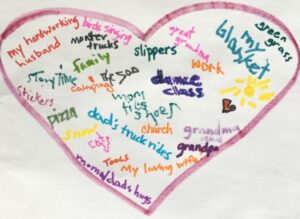A Grateful Heart
How would your world change if every time you were asked a question, you began your answer with, “I am grateful for…”?
When we choose a grateful heart, we are programming our mind with a powerful tool that will transform our world from negative to positive. We each have the power to express what we want our heart to reflect. Let’s discuss some ways to control our thinking and make a daily habit of appreciation.
Take control
There are many things in this world we cannot control and it’s easy for the mind to enter into a worrisome spiral. Instead of an ungrateful response, we can choose to look at each situation with a grateful response. This mindset creates a habit of gratitude which over time transforms denial into acknowledgement, confusion into clarity, chaos into order, and discontentment into enough.

Image: “A Reflective Heart” by Steph Hill
Try it out
- Recognize how our power and control comes from how we respond to situations. Make a daily decision to focus on gratefulness.
- Model gratefulness. When our loved ones and co-workers constantly hear us saying, “thank you” and “I’m grateful for…”, we are leading by example.
- Be specific when acknowledging thankfulness. Instead of asking, “What am I thankful for?”, ask
- “What is my favorite cozy place?”
- ”What makes me laugh?”
- “Who was I able to help today?”
- ”Who has shown me love?”
- Personalize your gratefulness by journaling, designing art, writing thank you notes, and sharing with those close to you.
- Choose to spend as much time as possible with the people who share your attitude of gratitude. Surrounding ourselves with positive people makes for an unstoppable force of inspiration.
- Keep a growth mindset. If we are patient with our growth and make a habit of thinking and verbalizing, “I am working on it” rather than, “I can’t”, our outlook will see endless possibilities and promote thankfulness.
- Last, but not least, take care of your heart!According to The American Heart Association, gratitude can help your health. In his book, The Little Book of Gratitude, Robert A. Emmons, Ph.D.,said, “Gratitude is good medicine”. Emmons goes on to share how clinicaltrials indicatethe practice of gratitude can have a dramatic effect in a person’s life and can lower blood pressure and strengthen immune function.

Image: Family Activity, “Attitude of Gratitude
Talk to Grandma
People who have been around a while seem to understand gratefulness. I’ve asked my 99-year-old grandmother about the secret of life and she always tells me something for which she is thankful. If we could all follow this example, we likely will unlock the fullness of life and get the gift of inner peace. A grateful heart puts us in a state of appreciating what we have, embracing others, and gives us an alternative and clarity about what it is front of us. Let’s change our world and choose a grateful heart by responding to each situation with, “I am grateful for…”.
References
American Heart Association, Thankfulness: How Gratitude Can Help Your Healthhttps://www.heart.org/en/healthy-living/healthy-lifestyle/mental-health-and-wellbeing/thankfulness-how-gratitude-can-help-your-health
Robert A. Emmons, Ph.D.,The Little Book of Gratitude https://www.goodreads.com/book/show/31142376-the-little-book-of-gratitude
Slumberkins, Attitude of Gratitude

 Written by Lesli Hill on February 15, 2021.
Written by Lesli Hill on February 15, 2021.